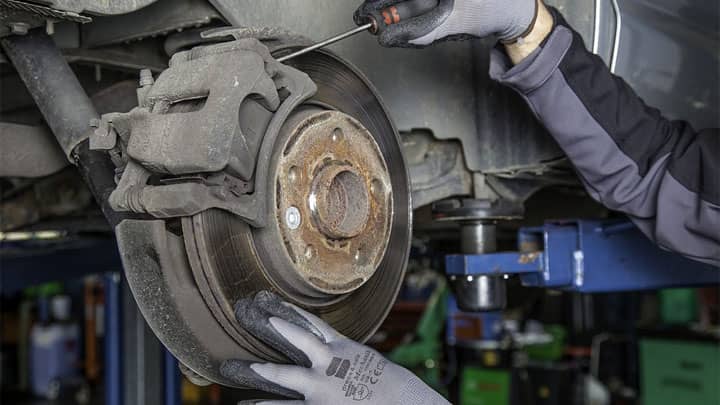
Have you ever experienced the unsettling sound of your brakes grinding, even though you just had the pads replaced? It can be concerning and make you feel like there’s something seriously wrong with your vehicle. But the truth is, this situation is more common than you think.
Brake pads are the most commonly replaced component in your vehicle’s braking system. It’s not uncommon for drivers to experience issues even after replacing their brake pads. The sound of grinding brakes can indicate a problem beyond just worn-down pads.
Understanding why your brakes are grinding with new pads can be difficult, but finding the root cause is critical. Grinding brakes can indicate worn-out components or a potentially dangerous problem with your vehicle’s brakes.
In this article, we’ll explore some of the most common reasons why brakes grind even when the pads are fine and what you can do to fix them.
Common Reasons For Grinding Braking Noise
The broken rotor requires a replacement
Your brake rotors are the glossy discs that your brake callipers press on to slow down your car. They are so close to the ground that dirt and water can get in and cause rotors to corrode or twist. Over time, the rotors can become unevenly worn, leading to a grinding noise when you apply the brake.
Non-flat brake rotor discs might create squeaky brakes, whilst a worn-out rotor disc can frequently produce a piercing shriek that can be heard through your steering column.
You can feel a lot of sound waves throughout the brake pedal and gearbox when you brake, so you’ll also sense a damaged rotor.
Loose Wheel Bearings
Wheel bearings are an essential component of the vehicle’s wheel assembly, responsible for providing smooth and comfortable driving.
However, worn or loose, they can cause a grinding noise when you apply the brakes. If you suspect this is the issue, it’s crucial to have your vehicle inspected by a mechanic immediately.
Caliper Issues
The brake caliper is a device that applies pressure to the brake pads to stop the vehicle. If the caliper becomes damaged or worn, it can cause the brake pads to grind against the rotors, resulting in a grinding noise.
Generally, a damaged or stuck caliper is easy to spot since it tends to cause the vehicle to pull to one side.
Low-Quality Brake Pads
Sometimes, cheaper brake pads can cause a grinding noise, even when new. The low-quality material can cause the pads to wear unevenly or develop glazing, leading to a grinding noise.
If you recently had your brake pads replaced with low-quality ones, it’s worth having them checked by a professional and replaced if necessary.
Low lubrication of your braking system
The braking system is typically complicated with numerous functional elements, and these brake parts will eventually need to be re-lubricated. If not properly lubricated, the calliper bolts in your car’s brakes might make a grinding noise.
The brake callipers are held firmly in place by the calliper bolts. But with time, they could start to rust, which results in a grinding noise. Oiling your calliper bolts once a month will extend their lifespan.
Fixes For Grinding Brake
Clean the Brake Components
One of the main reasons you might experience grinding brakes is the buildup of dirt, dust, and rust on the brake components. This buildup can cause your brake pads to make contact with the rotor unevenly, resulting in that annoying grinding sound.
To fix this issue, you should clean the brake components thoroughly. You can use a brake cleaner or a wire brush to remove dirt or rust buildup from the pads, rotors, and calipers.
Utilise a Better Brake Pad Compound
If your brakes are grinding, you’re probably using a poor-quality brake pad compound. This issue might be resolved by changing to a better compound.
Higher-quality compounds will last longer and not start to grind as easily because they are often less susceptible to wear and tear. Additionally, they are typically quieter than their inferior counterparts.
Check the Rotor for Warping
Over time, the rotors can become uneven or warped, causing the brake pads to contact the rotor unevenly. This issue can often be fixed by resurfacing the rotor. However, if the rotor is severely warped or damaged, you may need to replace it.
Replace the Brake Caliper
If your brake caliper is not functioning correctly, it can cause the brake pads to wear unevenly, resulting in a grinding noise. In this case, you may need to replace your brake caliper.
Remember, those brake callipers are an essential component of your braking system, so if you’re uncomfortable doing this yourself, it’s best to take your car to a professional mechanic.
Check the Anti-Rattle Clips
Anti-rattle clips are small metal pieces that help keep the pads in place and prevent them from vibrating or moving around.
If these clips become loose or damaged, they can cause the pads to vibrate, resulting in a grinding noise. To fix this issue, you can either tighten the clips or replace them if damaged.
The Bottom Line
As you can see, there are various reasons why brakes can grind, even if the pads are fine. If you hear grinding noises while braking, it’s essential to have your vehicle inspected by a professional mechanic to rule out any significant issues.
Start with cleaning your brake components and inspecting the rotor for warping. Check your brake callipers and anti-rattle clips if these steps don’t work.
Remember, your brakes are a critical safety component of your car, so if you need help with what to do or how to proceed, it’s best to take your car to a professional mechanic.


